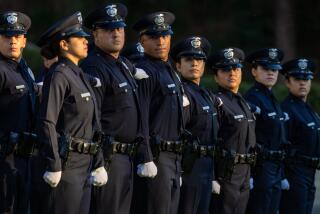Former CIA Spies Reveal Secrets of Craft
- Share via
It was a suspicious crowd that gathered Saturday at UCLA for a special lesson on espionage.
“Are you sure you’re from the L.A. Times?” one woman in the audience warily asked a reporter.
You couldn’t blame her.
More than 130 people who attended the daylong seminar were treated to a rare glimpse into the world of international deception by husband-and-wife team Antonio and Jonna Mendez, veterans who spent their careers helping the Central Intelligence Agency fight the Cold War.
Dubbed “Espionage 101: An Overview of Spycraft,” the event traced the history of spies from the Revolutionary War -- so Benjamin Franklin was an early James Bond? -- through World War II to today’s attempts to gather intelligence on terrorist groups.
There was an obvious lesson: Trust no one.
“I don’t know how many people in this room are spies,” Tony Mendez said, looking around the lecture hall. “But we always have to be alert to that.”
The audience chuckled. A few people shifted uncomfortably in their seats.
As part of the presentation, Tony Mendez detailed his work in rescuing six U.S. diplomats who secretly had sought refuge at the Canadian Embassy in Iran during the 1979 U.S. hostage crisis.
Mendez, an undercover operative, helped set up an elaborate tale in which the diplomats pretended to be part of a Hollywood movie production company -- Studio Six Productions -- looking for venues to shoot a new film.
To ensure that his story could withstand scrutiny, he set up a phony office in a Hollywood studio lot and tapped contacts in the film industry to find a real script he could use. He even ran ads in the local movie trade publications. The hoax was so realistic, he said, that filmmakers began mailing scripts to the office.The operation resulted in Mendez flying to Iran and successfully escorting the diplomats onto a plane bound for Zurich, Switzerland, without drawing suspicion from Iranian authorities.
“By the time we closed Studio Six Productions,” he said, “we had 26 scripts, one of them from [Steven] Spielberg.”
Jonna Mendez recounted her own career from secretary to undercover operative for the CIA as part of a presentation on the role of women in clandestine operations. She helped train foreign agents on how to use cameras hidden in pens and lipstick tubes to photograph documents. “I said, ‘This is so much more fun than typing,’ ” she recalled.
During the Cold War, several Western female spies were able to recruit Soviet double agents who provided valuable information, she said.
“The Russians didn’t use women,” she said. “In many parts of the world, they’re under the radar, invisible. And the CIA knows how to exploit it.”
The seminar, co-sponsored by the International Spy Museum in Washington, D.C., was part of a four-day espionage event put on by UCLA Extension.
At a breakfast scheduled for 10 this morning, the Mendezes planned to discuss disguises used by spies, including a demonstration. At 1 p.m., historian and author Timothy Naftali is to present the last of a series of lectures on the history of espionage.
Both events are at UCLA Extension’s administration building, at 10995 Le Conte Ave. in Westwood, and are open to members of the Osher Lifelong Learning Institute. Membership can be purchased at the events for $65.
Barry Bortnick, program director for UCLA Extension’s humanities and behavioral sciences department, said he believed that a few of the people who attended the seminar were interested in a career in espionage.
If that was true, no one was owning up -- at least not publicly.
Kevin Borquez, a former bodyguard who now works as a special education teacher in Monrovia, said he collects historical items linked to the Office of Strategic Services, precursor to the CIA, including lock picks and a large knife called a “smatchet.”
“For killing people,” he said.
Bjorn Ahlstrom, a retired chief executive of Volvo’s North American operations, said his interest in espionage was renewed after the Sept. 11, 2001, terrorist attacks. He said he watched New York’s World Trade Center collapse from across the Hudson River in Hoboken, N.J.
“It made me extremely interested in understanding what is going on in the world of espionage and international terrorism,” Ahlstrom said.
He said he was struck by the seminar’s message that lessons of spying as far back as World War II could be used today.
“It’s our time,” he said. “And the girls, the seduction. I love it.”
More to Read
Only good movies
Get the Indie Focus newsletter, Mark Olsen's weekly guide to the world of cinema.
You may occasionally receive promotional content from the Los Angeles Times.











